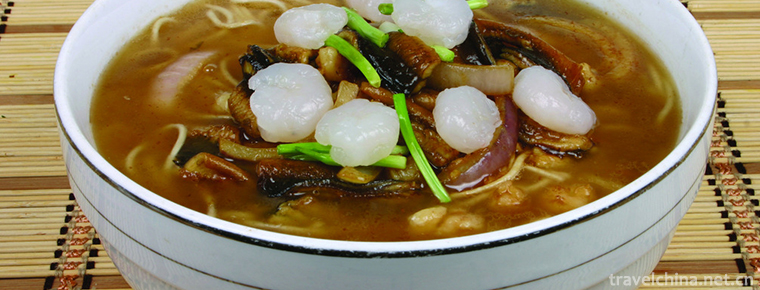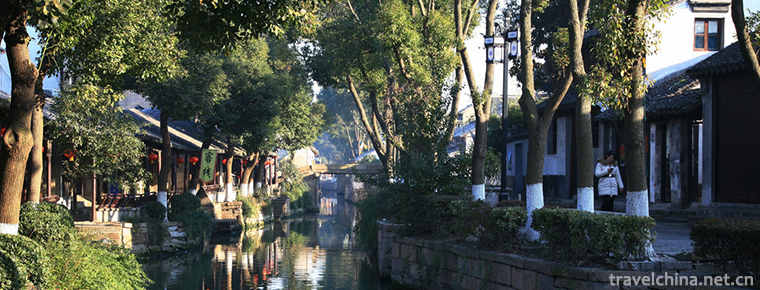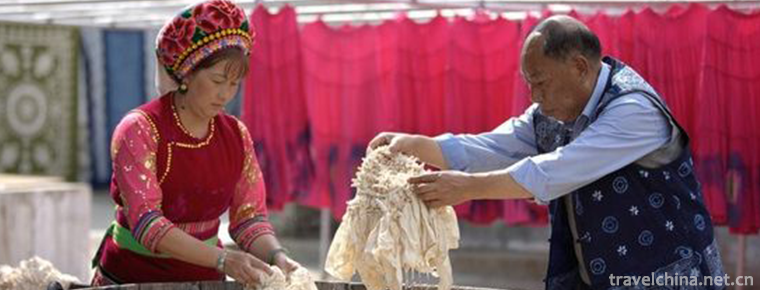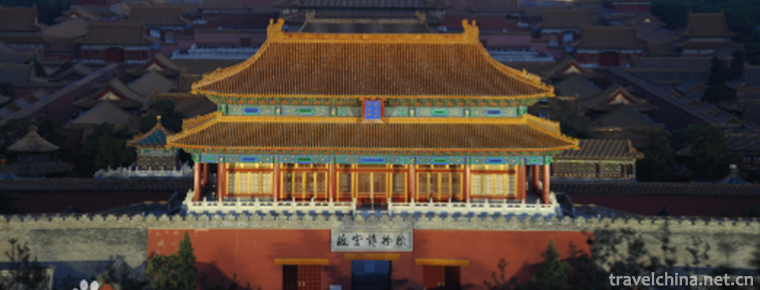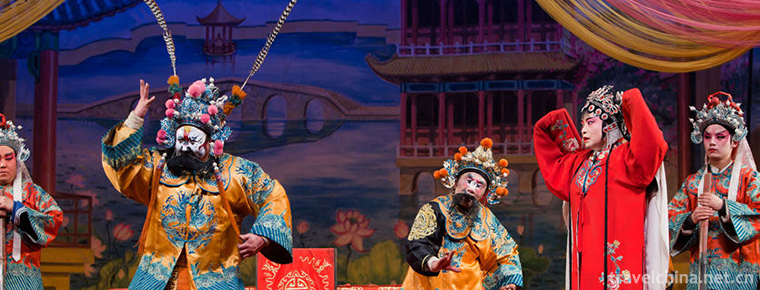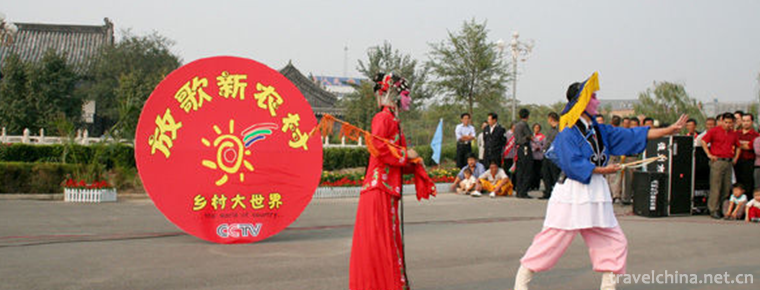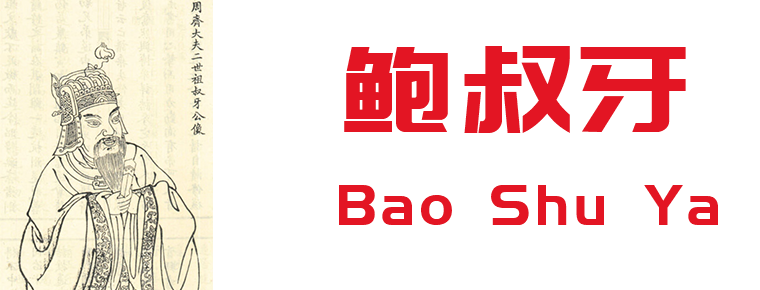Legend of King Qian
Legend of King Qian
The legend of King Qian is a local folklore derived from the life stories of King Qian Si of Wuyue. Linan is the hometown of King Qian. After his death, his legends have been widely circulated in Linan for thousands of years. Everyone knows that the life story of King Qian Meru of Yue has evolved into a folklore.
On May 23, 2011, Bantouqu, which was declared by Linan City, Zhejiang Province, was listed in the third batch of national intangible cultural heritage list with the approval of the State Council.
Historical Origin
Qian Wang, the name of Qian Lu, is from Linan. As a teenager, he was a local scoundrel and traded in salt smuggling. At the end of the Tang Dynasty, following Tang general Dong Chang, Ren Du's commander and envoy, participated in the suppression of the Huangchao Rebellion. In 893, he served as the naval envoy of the town. In 896 AD, Dong Chang was defeated and occupied southern Jiangsu and the two Zhejiang provinces (eastern and Western Zhejiang) to form a separatist force. In May 907, Emperor Liang feuded him King of Wu and Yue, and established his country as the capital of Qiantang, which was named Tianyou by Emperor Aidi of the Tang Dynasty and Tianbao by the second year.
The legend of King Qian is a legend of King Wu and King Qian. It is a folklore derived from the life story of King Qian Si of Wu and Yue. Lin'an is the home of King Qian. After his death, his legends have been widely circulated in Linan for thousands of years. In the notes of Song and Yuan Dynasty, Song Wenying's Xiangshan Wild Record, Xianchun Linan Zhi, Liu Yiqing's Qiantang Heritage and other local chronicles have been recorded and extended to the United States, Japan, South Korea, Singapore and other countries. The legend of King Qian has a long history and rich content. It includes the legend of King Qian's life and family background, the legend of arduous entrepreneurship and achievements, and the legend of eliminating violence and peace and caring for the sufferings of the people. In recent years, the legend of King Qian has been created into dramas, movies, TV dramas and so on. These literary arts have exerted a great influence on the people and promoted the spread of oral stories to a certain extent.
primary coverage
Qian Wang Shouchao
The tide of Qiantang River is always very big. The tide head is high and the impact force of the tide is fierce. Therefore, the dykes on both sides of Qiantang River are always repaired on this side and washed down on the other side. "A bucket of gold is built every day on the Yellow River, and a bucket of silver is built every day on the Qianjiang River." At that time, the disaster brought by the tide to the people can be imagined from this sentence.
By the end of the Tang Dynasty, there was a king of Wu and Yue called Qian Nie, who was extremely brave. At that time, most people called him "Qian Wang".
When King Qian governed Hangzhou, all kinds of things were easy to do, that is, the Qiantang River's seawall could not be repaired well. Because just to be repaired, the tide will come twice a day and night, it is impossible to build the seawall. Therefore, the people under Qian Wang were very anxious, and they were afraid that Qian Wang would lose his temper, so they had to report to Qian Wang: "King, this seawall is still not repaired, it will never be repaired. Because there is a tide God in the Qiantang River who is against us. Only when we build the seawall about the same, he will make waves, raise the tide head and wash down our seawall.
King Qian listened to the fire all over his stomach. He was so angry that his beard stood upright one by one. His eyes stared like bronze and he shouted fiercely, "Bark! You useless guys! Why not drag the Tide God up and kill him?
The men hurried and said:
"It can't, it can't. He's a Tide God, living in the sea with the Dragon King! We can't find him. What's more, when he came, he rolled with the tide and was in the water of the tide; we mortals could neither see nor catch him. People are looking for it in iron boats, and they will be swallowed up whenever they meet the tide.
When King Qian heard this, he saw Mars in his eyes and roared:
"Bah! Is it right to let this little tide God do something wrong? No way!"
King Qian thought for a moment and said:
"Well, let me surrender him myself. On the eighteenth day of August, I will gather 10,000 archers to the riverside, and I will go to see the Tide God!
Why did you choose August 18? Originally, the eighteenth of August was the birthday of Chaoshen, which had the highest tide and the most ferocious water, and Chaoshen would ride a white horse on the tide on that day.
When August 18 arrived, a large king's platform was built along the Qiantang River. The king came to the stage early in the morning to watch the movement and wait for the arrival of the tide god. However, 10,000 elite archers selected from the local area have been uneven one after another. When King Qian saw that they were too slow, he ordered them to assemble immediately to the riverside and arrange a good position.
Then a general came forward and knelt down.
"King! When the archer runs to the river, he passes through a gemstone mountain, where the mountain road is narrow and can only be passed by one person. Besides, he has to climb up and down again to cross the mountain, so he comes slowly.
King Qian listened and drank:
"Ah, don't you delay the great event of eliminating Tide God!" Immediately he jumped on a thousand miles horse and flew to the front of the gemstone hill. As soon as he saw it, he did. He ran up to the top of the mountain and looked around, only to see a crack in the southern half of the mountain. So he sat down and put his feet on the cracks in the hill. He pushed hard. Ha! The mountain even gave him a push, and a wide road appeared in the middle. When the generals met, everyone cheered and everyone cheered! It was not long before all the archers crossed the road and gathered by the river. —— From then on, it was called "Tie Kai Ling". The king of Qian's big footprints are still deeply sunk in the stone wall.
King Qian rode his horse and made a quick tour around the river. By the time he got to the Grand King's Platform by the river, 10,000 elite soldiers had already lined up and looked at the river with their bows and arrows in their majestic and high spirits. The people along the Qianjiang River have suffered all kinds of tide disasters, and they have to build dikes to control the water. Who is not happy and who is not doing their best? Nowadays, I hear that King Qian is fighting to watch the battle and cheer the tide god. It is a closed house. Everyone goes out and dozens of miles of riverbanks are overcrowded with people. When Qian Wang saw such momentum, he became more courageous. He busily asked people to bring his pen and ink and wrote two lines of poetry.
"For the newspaper tide God and Shuifu,
Qiantang and Qiantang."
Immediately throw the poem into the river and say aloud:
"Hey, Tide God listened! If you promise, don't bring the tide! If the tide is still coming, don't blame my men for their mercilessness!"
When the people on the shore and the archers heard it, they all cheered, and the sound was like thunder. Everyone looked nervously at the river and watched the movement. But Chaoshen did not heed Qian's warning. After a while, he saw a long white line, rolling faster and faster, and more and more fiercely. When it came near, it was like an iceberg exploding and overturned snowdrifts rushing and rolling straight towards Dawangtai. When King Qian saw him, he roared and shouted, "Let's shoot arrows!" As soon as his voice fell, he took the lead in shooting an arrow at the old man.
At this time, only 10,000 elite soldiers were seen shooting at the tides with all their arrows. The people stamped their feet and clapped their hands and shouted for support. Ten thousand arrows were fired, and ten thousand arrows were fired; ten thousand arrows were fired, and ten thousand arrows were fired; the "old man" fired thirty thousand arrows at once, so that the tide did not dare to hit the shore. King Qian again ordered, "Pursuit!" The tide had to zigzag to the southwest, and finally disappeared without trace. Therefore, till today, the tide has almost disappeared at the edge of the Liuhe Tower; and in front of the Liuhe Tower, the river flows zigzaggingly forward, like a word "Zhi", so people call this place "Zhi Jiang".
From then on, the seawall had to be built. In order to commemorate Qian Wang's achievements in shooting the tide, the people called the seawall by the river "Qiantang".
Inheritance Significance
The legend of King Qian is a huge "legend group" and the collective creation crystallization handed down for thousands of years. It has extensive popularity and folk inheritance, and has important historical, cultural and research value.
Qian Si was the founder of Wu and Yue Kingdom in the Five Dynasties, the main pioneer of Wu and Yue culture, the pioneer of China's economic and cultural center from the north to the south, the founder of "paradise on earth" in Su and Hangzhou, and Qianwu Langren in Jincheng Town, Linan City. Local people call Qian Si "King of Qian", and there are many legendary stories about him.
The legend of King Qian is a popular and influential folk tale in Wuyue area of China. The family education of Qian family is very strict, and the descendants of Qian family have many brilliant achievements. Qian Qichen, Qian Zhengying, Qian Xuesen, Qian Weichang, Qian Sanqiang, Qian Zhongshu, Qian Fu, Qian Mu... Qian Yongjian, a Chinese scientist who won the 2008 Nobel Prize in Chemistry, is the descendant of the Queen of Qian. According to incomplete statistics, there are more than 100 Qian celebrities at home and abroad who are only academicians of the Academy of Sciences, and they are distributed in more than 50 countries in the world.
The legend of King Qian is a folklore derived from the life story of King Qian of Wuyue. It is well known to all women and children in Linan. Almost all the places where King Qian has been active have his legend stories. The legend of the King of Qian is rich in content, including the legend of the life and family background of the King of Qian, the legend of the King of Qian's brave deeds and achievements, as well as the legend of place names and customs. The legend of King Qian has condensed the understanding, views and feelings of the masses for thousands of years, reflecting the simple and distinct historical and aesthetic views of the masses. At present, the legend of King Qian has special significance in promoting cross-strait exchanges and cultural identity of overseas Chinese.

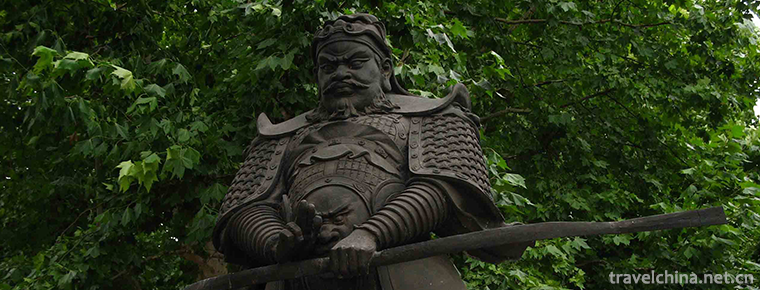
-
Noodles with quickfried eel shreds and shelled shrimps
Shrimp fried eel noodles is a famous traditional food in Kui yuan hall, Hangzhou City, Zhejiang province. When the shrimp is cooked with fried eel noodles, select the strong fresh eel,.
Views: 158 Time 2018-10-27 -
Luzhi Ancient town
Yongzhi Ancient Town belongs to Wuzhong District of Suzhou City. It is located in the east of Suzhou City. It is 18 kilometers west of Suzhou City and 58 kilometers east of Shanghai..
Views: 100 Time 2019-02-06 -
Bai nationality tiedyeing skills
Bai tie-dyeing technology, the local traditional textile dyeing technology in Dali City, Yunnan Province, is one of the national intangible cultural heritage..
Views: 209 Time 2019-04-03 -
Construction Skills of Official Ancient Architecture
In the process of construction and maintenance of the Palace Museum ancient buildings, a complete set of traditional palace building construction techniques with strict shape has been formed on the ba.
Views: 296 Time 2019-05-01 -
Shangdang Laozi
Shangdang Laozi is one of Shanxi local operas. It is a kind of opera popular in southeastern Shanxi. Shangdang Laozi is a tributary of Wu'an Laozi in Hebei Province. During the Daoguang period of the .
Views: 379 Time 2019-06-13 -
Yigou gou
"Yigou" is a traditional drama in Gaotang area of Shandong Province and one of the national intangible cultural heritages..
Views: 127 Time 2019-07-12 -
Health preservation in traditional Chinese medicine
Health preservation in traditional Chinese medicine refers to a kind of medical activity that can prolong life by taking care of life, strengthening physique and preventing diseases in various ways. H.
Views: 231 Time 2019-08-03 -
North Sichuan Medical College
North Sichuan Medical College is located in Nanchong City, a famous historical and cultural city in Sichuan Province and the birthplace of Three Kingdoms Culture. The school's predecessor was the Nort.
Views: 281 Time 2019-08-31 -
Bao Shu Ya
Bao Shuya (the first 723 years or the first 716 years - the first 644 years). Si Surname, abalone His name is a famous uncle. Yingshang (now belongs to Anhui (person) the Spring and Autumn period Qi S.
Views: 167 Time 2019-09-11 -
Huanglian earth forest
Huanglian earth forest, namely the earth forest in huanglianguan Town, is a geomorphic landscape developed on a set of ice water freeze-thaw debris flow deposits. Huanglian earth forest is located in huanglianguan Town.
Views: 154 Time 2020-10-16 -
Cultural undertakings in Panzhihua
As of the end of 2018, Panzhihua has 3 museums and exhibition halls; 50 cultural (Art) museums, including 44 cultural stations and 8 theatres and cinemas; and 6 public libraries, with a total collection of 990800 books. There are 43 Township radio and television stations and.
Views: 245 Time 2020-12-14 -
Meishan economy
In 2019, the gross domestic product (GDP) will reach 138.02 billion yuan, an increase of 7.5%. Among them, the added value of the primary industry was 19.916 billion yuan, an increase of 3.0%; the added value of the secondary industry was 52.713 billion yuan,.
Views: 340 Time 2020-12-18
